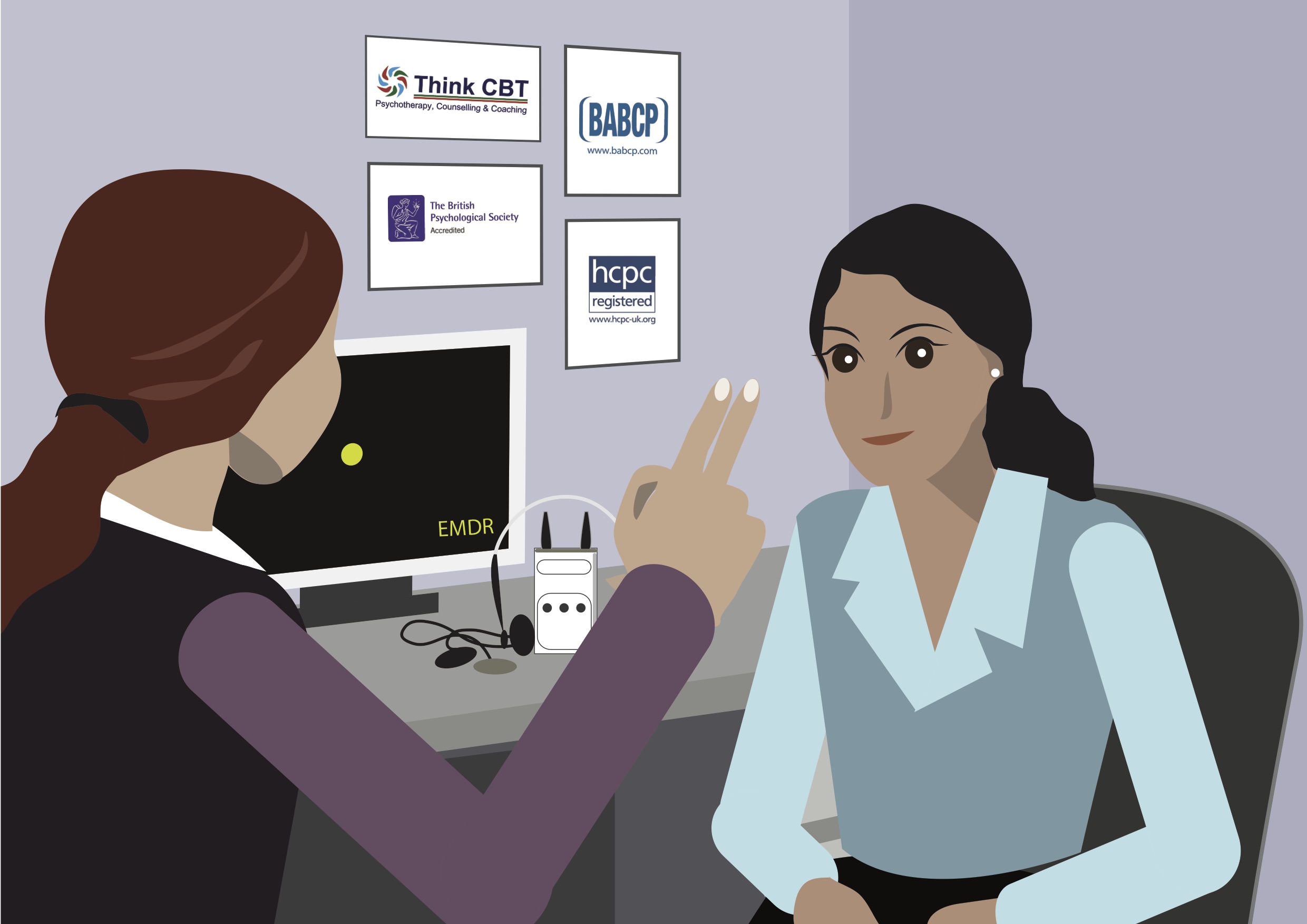Eye Movement Desensitisation and Reprocessing (EMDR) In London, UK-wide and Online via Video Link
We provide Eye Movement Desensitisation and Reprocessing (EMDR) treatment from our clinics in London, from many of our 200 plus UK consulting rooms and online via video link. Our EMDR therapists have received accredited clinical training to an advanced level, so you know that you are working with a real EMDR expert. EMDR is a NICE recommended treatment of choice for trauma, PTSD and other psychological disorders and the research evidence proves that it works. To talk to an EMDR expert about treatment for trauma-related problems, PTSD or other anxiety conditions, call +44 1732 808 626 or email appointments@thinkcbt.com
What is EMDR?
Eye Movement Desensitisation and Reprocessing (EMDR) is a scientifically validated therapeutic approach to managing emotional and psychological problems. EMDR was originally developed for the treatment of Post Traumatic Stress Disorder (PTSD). More recently, clinical research has demonstrated that EMDR provides an effective treatment for phobias, panic disorder, Obsessive Compulsive Disorder, chronic pain, performance anxiety, complicated grief and sexual and physical abuse.
How EMDR Works
During the Desensitisation phase, the client is asked to bring to mind the memories, images, thoughts, emotions and sensations associated with the traumatic or feared situation. Bilateral eye movements are used to keep the client anchored in the present whilst observing or re-experiencing the effects of the distressing situation or memory.
Once the client's trauma or distress levels have reduced, the Reprocessing phase is used to install an adaptive coping belief to deal with future triggers or memories.
Online EMDR Treatment
Eye movement Desensitisation and Reprocessing can be effectively delivered online via video session. The EMDR process works in the same way and the same techniques and clinical protocols are applied. The research data demonstrate that online video based EMDR delivers the same results, providing a flexible alternative without the travel and time limitations of face-to-face therapy. To talk to a fully qualified EMDR Consultant about online EMDR options, email appointments@thinkcbt.com
The EMDR Process
The EMDR protocol is highly structured and can only be delivered by a qualified clinician specially trained in EMDR techniques. These steps can be delivered as a stand-alone treatment or integrated into a Cognitive Behavioural Therapy treatment plan. The EMDR process involves eight phases:
{slider Read more|closed|blue}
- Undertaking a detailed psychological assessment of the presenting problem. This normally involves talking about background factors, traumatic incidents, associated problems and any other underlying vulnerabilities.
- Preparing and educating the client on the EMDR process. This involves explaining the approach and training the client in good coping techniques before starting the EMDR process.
- Completing an EMDR assessment of the images, thoughts, emotions and physiological sensations associated with the traumatic or distressing event, as well as working on a preferred realistic appraisal.
- Undertaking bilateral stimulation (eye movements, taps or tones) to desensitise the client to the traumatic or distressing reaction.
- Using eye movements, taps or tones to install positive cognitions and emotions associated with a realistic and functional appraisal of the traumatic or distressing memory.
- Undertaking a self-body scan to identify any remaining distressing sensations associated with the original memory.
- Bringing the process to a close and checking for any other links or associated distressing reactions.
- Reviewing the client's initial therapeutic goals and testing resilience by identifying real life situations that the client would normally find highly distressing.
Research studies have consistently demonstrated that EMDR can significantly accelerate the healing process after a traumatic experience and that the effects are long lasting. There are now more scientific studies into the use of EMDR for Post Traumatic Stress Disorder, than for any other clinical or therapeutic approach.
EMDR provides a fast and relatively unobtrusive approach to changing the underlying cognitive and neurological patterns that maintain traumatic emotional reactions, as well as a wide range of other anxiety and depression related problems. .
EMDR is designed to be used as a stand-alone process, but can also be effectively integrated into Cognitive and Behavioural techniques for the treatment of trauma and anxiety. If you want to find out more about how we use EMDR or book an initial free telephone consultation, you can complete the simple contact form on this page.
{/sliders}
EMDR In the Treatment of Trauma
When people experience traumatic or highly distressing events, the brain can become temporarily overwhelmed and unable to effectively process or integrate information in the normal way. Consequently, traumatic experiences can become stored as fragmented and intensely disturbing memories, images, emotions and bodily sensations. This can lead to severe psychological distress involving frightening intrusive thoughts, flashbacks, nightmares, dissociation and hyper arousal when the traumatised person is triggered or under stress.
Traumatised people often report a dissociative state in which they "re-experience" the traumatic event itself or the overwhelming emotional, psychological and physical sensations associated with the event. This is common in people suffering from Post-traumatic Stress Disorder, (PTSD).
Traumatisation and PTSD can profoundly affect the individual's ability to function normally. It can lead to terrifying dissociative experiences, imagined recurrences, negative intrusions and intensely distressing emotional and physiological reactions. Traumatisation can progressively undermine coping behaviours and lead the individual to doubt their own psychological stability and sanity.
EMDR Treatment Charges
EMDR appointments are normally delivered over a 90-minute appointment. Our EMDR charges are therefore based upon our standard therapy rates pro rata over the 90 minute appointment. All of our EMDR Consultants also have core psychological training in CBT, clinical or counselling psychology.
To book a free informal consultation with an EMDR specialist, call +44 1732 808626, complete the appointment form on this page or email appointments@thinkcbt.com








